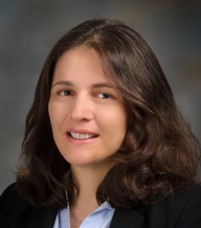
My 2.5-year journey with translocation renal cell carcinoma
April 30, 2024
This is a guest post by Dawn Dyson, 37, who was diagnosed with translocation renal cell carcinoma in 2022. Dawn…
Read More
Dr. Niki Zacharias Millward, PhD, received a 2023 KCA Chromophobe RCC Focus Award for research on “Leveraging patient-derived xenograft models to identify and therapeutically target metabolic hallmarks of chromophobe renal cell carcinoma.” Dr. Millward is an assistant professor in the Department of Urology – Research, Division of Surgery at MD Anderson Cancer Center in Houston, Texas. We spoke with Dr. Millward about her research and the impact it can have on people with kidney cancer.
Can you briefly summarize your research project?
Rewiring of cellular metabolism is hallmark of cancer. Metabolism is the use of small molecules for energy production and for the creation of larger molecules such as DNA or protein. Cancer cells have to highjack metabolic pathways to fuel their growth. My lab seeks to understand the metabolic changes that drive cancer progression, how these changes create therapeutic vulnerabilities, and how metabolic imaging can be used to monitor therapeutic response.
Another area my lab works on is the creation of urologic cancer animal models. Preclinical models help in the discovery of new therapies and interrogating complex systems like metabolism. My lab, in collaboration with urologists Drs. Surena Matin and Jose Karam, take resected patient tumor tissue and embed it in immunocompromised mice. Using this method, we have been able to generate two chromophobe renal cell carcinoma (RCC) animal models.
In addition, we know two interesting differences between chromophobe RCC and the more common clear cell RCC subtype. Chromophobe RCC is characterized by a high density of abnormal mitochondria, the energy factories of the cell. In addition, the tumor suppressor protein p53 is mutated in approximately 58% of metastatic chromophobe cases, whereas it is rarely mutated in other kidney cancer subtypes. This tumor suppressor is an important regulator of energy metabolism and links metabolism with DNA repair and programmed cell death. This led me to the hypothesis that metabolism is altered in chromophobe RCC compared to clear cell RCC and could be a therapeutic vulnerability. Our project will test this theory.
Why is chromophobe RCC so different from clear cell RCC?
We know molecularly chromophobe RCC is very different from clear cell RCC and this leads to it behaving differently clinically. Although on average chromophobe RCC has a more indolent course than clear cell RCC, once it metastasizes it is far less likely to respond to tyrosine kinase inhibitors, immune checkpoint therapies, or cytotoxic chemotherapy agents. Our grant will specifically look at one molecular difference (metabolism) between chromophobe RCC and clear cell RCC. In addition, we will determine if modulating metabolism in chromophobe RCC with small molecules reduces tumor growth.
What kinds of drugs would mitigate the loss of p53 function and how available and safe are they?
Mutations in p53 often occur in cancer and research on how to mitigate loss of p53 has been an area of interest for over twenty years now. However, currently there are no p53 clinical therapies approved in the United States but new approaches for targeting p53 are currently being explored. There is an excellent 2023 review in Nature Reviews Drug Discovery discussing these new approaches. The number of p53 targeted clinical trials keeps doubling every 10 years so I believe there is a high probability that at some point a p53 targeted therapy will be approved for the treatment of cancer.
What do you think is most exciting about your research for patients and families?
I think one of the most exciting aspects of my research is our animal models. Metastatic chromophobe RCC is very rare and there are very few preclinical models. Our preclinical animal models are generated straight from patient tissue. This allows us to test drugs and monitor tumor response, use tumor tissue for very specialized analysis to determine what biomarkers such as genes or proteins correlate with response, and test different imaging methods in a living organism. This allows us to be more confident about translating a drug to the clinic and what biomarkers could be used to determine which patients would respond.
What motivates you?
As a PhD, all my effort is focused on research and I love what I do. I get to do something different every day. I am constantly learning, thinking, and designing experiments, and working with others in proving a hypothesis. At MD Anderson, I get to work with wonderful people such as genitourinary oncologists Drs. Nizar Tannir and Pavlos Msaouel. Both are physician-scientists specializing in kidney cancer. Pavlos’ laboratory is right across from mine. Pavlos and Nizar are great collaborators and help me in understanding the progression and current treatments for chromophobe RCC. Our team is passionate about the work we do and are driven by the potential clinical impact it has on kidney cancer patients.